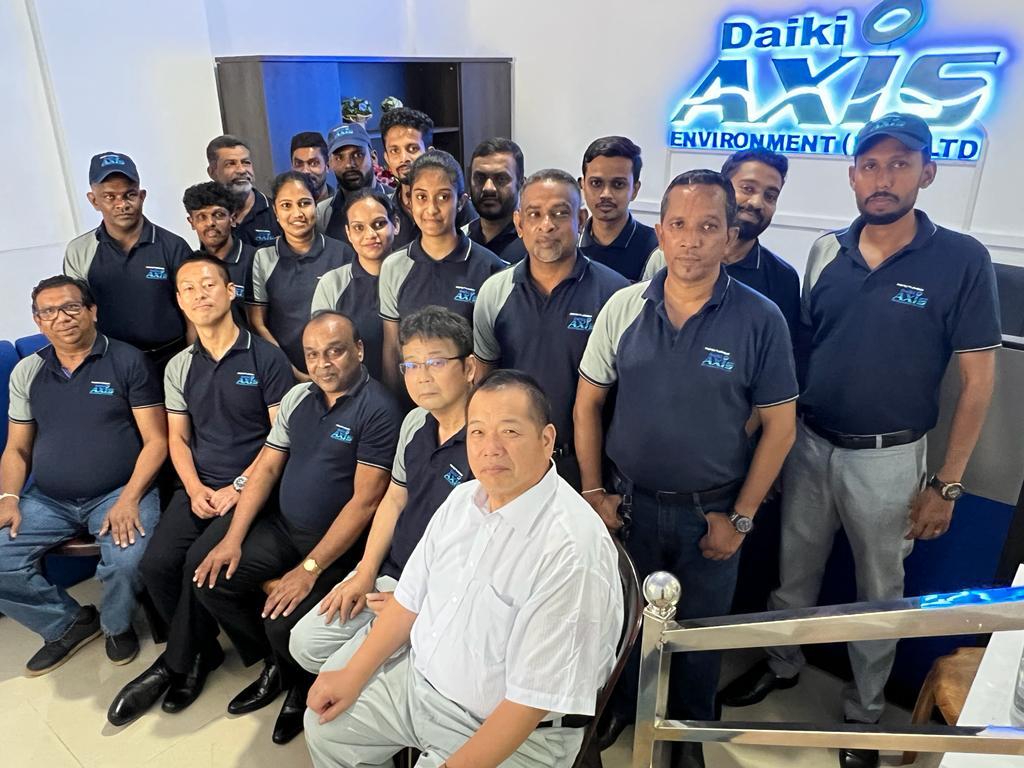Analyst Report for Daiki Axis Co., Ltd. (4245, Tokyo Stock Exchange Prime)
Daiki Axis Group is engaged in various businesses, including environmental equipment, household equipment, and renewable energy operations. The environmental equipment business is the main driver, focusing on the manufacturing, construction, sales and maintenance of various water treatment facilities, first and foremost being Johkasou systems. Products are categorized for applications such as domestic wastewater treatment, industrial wastewater treatment, and community wastewater treatment. The company offers optimal wastewater treatment facilities tailored to different water qualities, including those made of synthetic resin or concrete, and conducts design and construction tailored to the local environment for the treatment of sewage and domestic wastewater. The company expands its operations overseas, primarily in the Asian region, establishing a network of sales distributors and transitioning to local production in high-demand regions for agile and efficient responses. Maintenance services cover facilities sold and constructed by the group, as well as maintenance of equipment from other manufacturers. Dedicated departments ensure a 24-hour monitoring system and provide spot maintenance, establishing maintenance systems tailored to customer needs. By maintaining long-term customer relationships, the company utilizes information gained from maintenance to develop future products and support sales activities, providing total services related to various water treatment processes throughout its business operations. The household equipment business focuses on the sales of housing-related products and interior/exterior construction for educational facilities. The renewable energy business operates in the field of renewable energy and engages in power sales related to solar power generation and small-scale wind power generation, small-scale wind power generator-related operations, biodiesel fuel business, and hydrothermal treatment business. The company aims to expand its business with clean energy to reduce environmental impact while proposing high-value-added businesses in anticipation of post-FIT (Feed-in Tariff) era. Additionally in other business, it operates a household drinking water business, manufacturing and delivering bottled water, and handling water purifiers connected directly to water supply systems.
The business environment surrounding the Daiki Axis Group during the cumulative period of the first quarter of the fiscal year is characterized by the prolonged impact of the COVID-19 pandemic, including the high transportation costs, which are gradually recovering. However, the future economic outlook remains uncertain due to significant disruptions in the international situation, resulting in high energy prices and soaring raw material costs. In response to these circumstances, the company aims to enhance its corporate value by driving the medium-term management plan, “PROTECT x CHANGE,” with the final fiscal year set as 2025. Specifically, within the environmental equipment business segment, the company focuses on expanding its overseas operations in countries such as India, the expansion of maintenance services and water ESCO (Energy Service Company) businesses as part of its recurring-revenue business strategy. In the household equipment business segment, the company aims to transition from stable businesses to growth businesses by exploring new environmentally friendly and highly livable products. In the renewable energy business segment, the company strives to achieve a circular economy, strengthen stable revenue generation, and explore high-value-added businesses and products in anticipation of the post-FIT era (Feed-in Tariff). Furthermore, across the entire company, efforts are being made to reinforce the organization for the realization of IT strategies and to leverage IT as a tool to improve productivity.
During the cumulative period of the first quarter, the consolidated net sales for the company amounted to 10,770 million yen (a decrease of 2.3% Year-on-Year). The gross profit was 2,193 million yen (an increase of 2.2% Year-on-Year), operating profit was 237 million yen (a decrease of 47.8% Year-on-Year), ordinary profit was 250 million yen (a decrease of 53.0% Year-on-Year), and net profit attributable to the parent company’s shareholders for the quarter was 104million yen (a decrease of 70.4% Year-on-Year). In the first quarter, the company incurred significant increases in selling, general, and administrative expenses due to investments in human capital, organizational infrastructure strengthening measures, investments in overseas operations, investments in growth areas through mergers and acquisitions (M&A), and a review of corporate governance. Furthermore, the company submitted an application for standard market listing on the Tokyo Stock Exchange (TSE) and has completed the acquisition and cancellation of the second tranche of new share subscription rights (with exercise price adjustment clauses and exercise permission clauses) through third-party allocation.
For the environmental equipment business, in the domestic market, the sales of Johkasou and wastewater treatment systems increased compared to the previous quarter due to a recovery in demand for facility investments, leading to a significant increase in repair project orders. In terms of overseas sales, there was an increase driven by the completion of large-scale industrial wastewater treatment facility projects in China and the solid performance of operations in India. However, there were no equivalent projects to the delivery of Johkasou systems to the JICA-supported project in Iraq during the same period of the previous year, resulting in an overall decrease in overseas sales. The maintenance sales, which are part of the company’s recurring-revenue business, have been progressing well due to efforts to expand contracts. In the groundwater drinking water conversion business, the sales related to ESCO contracts, also a recurring-revenue business, increased due to new contracts. Sales of groundwater drinking water conversion systems without ESCO contracts also increased due to growing customer demand.
For the household equipment business, regarding the sales of construction-related companies, the impact of shipment restrictions on products due to overseas parts sourcing by manufacturers has been resolved. Sales, mainly of water-related products for construction-related companies, have increased due to the recovery in demand for facility investments in hotels, nursing homes, and other facilities. Sales have decreased in lighting renovation projects for hardware stores and projects related to educational facilities. The sales of retail products for hardware stores have increased compared to the same quarter of the previous year. In the housing equipment division, there were successful large-scale projects in exterior wall construction and refrigeration, air conditioning, and cooling equipment installation. However, there were no store construction projects for the DCM Group, which operates hardware storefronts, which were included in the sales figures for the previous consolidated fiscal quarter. A large-scale project that applies cost recovery criteria for air conditioning equipment installation was ongoing at the end of the current quarterly consolidated accounting period. For this project, sales and costs are recognized as the same amount until completion, resulting in a decrease in segment profit margin.
For the renewable energy business, in the solar power generation business, the acquisition of Sanei Ecohome Co., Ltd. in October 2021 had a significant impact on the increase in sales in the previous quarterly consolidated period. Previously, the company not only engaged in electricity sales through the feed-in tariff (FIT) system but also sold power generation facilities. However, due to the recognition of sales for projects contracted before the acquisition, sales decreased compared to the same quarter of the previous year. In the small-scale wind power generation business, sales were recorded in the previous quarterly consolidated period for the “Low Carbon Technology Research Development and Demonstration Program” jointly participated by the company and three other companies under the Ministry of the Environment. As a result, sales decreased compared to the same quarter of the previous year. Currently, there are 18 operational sites for small-scale wind power generation utilizing FIT, and the company plans to have a total of 70 operational sites by 2025. In the biodiesel fuel-related business, the company focused on strengthening the sales of “B5 Diesel,” which can be used as a substitute for regular diesel by blending 5% biodiesel fuel. The number of contracts has steadily increased, and sales have increased compared to the same period of the previous year. The hydrothermal treatment business is conducting research and development to establish new technologies.
To further access analyst reports (KCR RESEARCH CORPORATION issued) please use the link below.
http://b-ir.co.jp/pdf/report/1689057437-en.pdf









